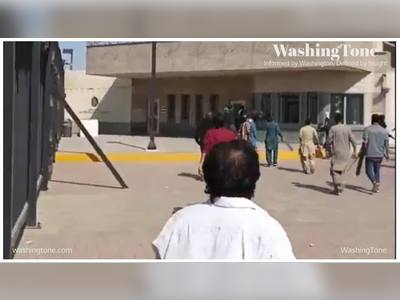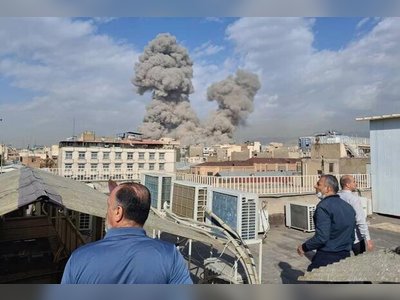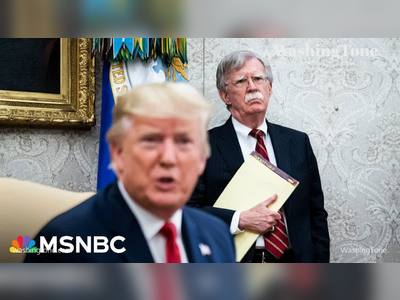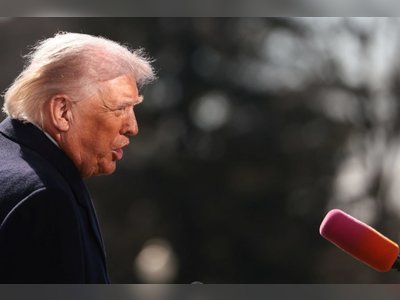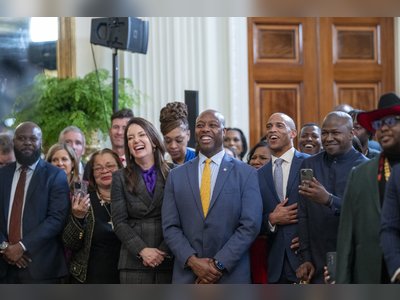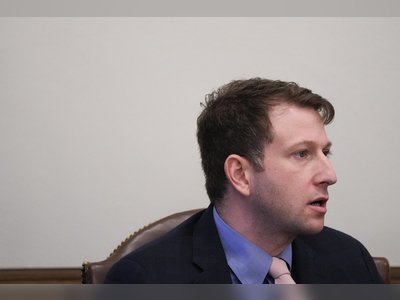White HouseSenateThe HouseSupreme CourtFederal ReserveDOJState DepartmentTreasuryCensusBudget OfficeTrade Representative
WashingTone
Informed by Washington, Defined by Insight
Monday, Mar 02, 2026
WashingTone

Vice President Harris Meets with Bahraini Leaders to Enhance Bilateral Ties and Regional Security
The conversations between the Vice President and both King Hamad and Crown Prince Salman emphasize the collaboration between the U.S. and Bahrain, concentrating on defense, trade, and regional stability.
On January 10, 2025, Vice President Kamala Harris had separate phone conversations with Bahrain's King Hamad bin Isa Al Khalifa and Crown Prince Salman bin Hamad Al Khalifa.
These discussions underscored the longstanding U.S.-Bahrain relationship, highlighting collaborative efforts to enhance cooperation in defense, trade, and regional stability.
The Vice President conveyed her regret over not being able to visit Bahrain due to the ongoing wildfires in Los Angeles but reaffirmed her commitment to continued collaboration with the nation.
Strengthening U.S.-Bahrain Relations
During these calls, Vice President Harris reiterated the robust and lasting bilateral relationship between the United States and Bahrain, a key element of U.S. policy in the Gulf region.
This relationship has grown stronger under the Biden-Harris Administration, notably with the 2023 signing of the Comprehensive Security Integration and Prosperity Agreement (C-SIPA).
C-SIPA, introduced during a meeting between the Vice President and Crown Prince Salman in March 2022, represents a major regional milestone, enhancing cooperation in defense, trade, science, and emerging technologies.
The Vice President expressed her pride in the C-SIPA framework, seeing its potential as a model for future regional integration.
The agreement has facilitated deeper economic and security ties between the U.S. and Bahrain, along with the United Kingdom's recent decision to join C-SIPA.
This move highlights the agreement's widespread appeal and sets a precedent for enhanced collaboration between the U.S. and its regional allies.
In their discussions, both leaders acknowledged the importance of building on this foundation to address shared challenges and pursue collective goals.
Security and Military Cooperation
A crucial component of the U.S.-Bahrain partnership is their security cooperation.
Bahrain hosts the U.S. 5th Fleet and U.S. Naval Forces Central Command, making it an essential partner in ensuring maritime security and regional stability.
Vice President Harris expressed gratitude for Bahrain’s crucial role in hosting these U.S. military assets, which are vital for maintaining a strong U.S. military presence in the Gulf and beyond.
Bahrain’s strategic location and support for U.S. defense initiatives have been instrumental in confronting security threats from regional players, including Iran.
The Vice President and the Bahraini leaders discussed the importance of working together to secure critical waterways, protect international trade, and counter regional security threats.
Additionally, the Vice President highlighted the need for enhancing regional stability through close collaboration with partners like Bahrain.
This sentiment aligns with the Biden-Harris Administration’s broader strategy to strengthen alliances and forge coalitions that foster peace, security, and prosperity in the Middle East.
Middle East Developments and Regional Cooperation
Apart from security issues, the Vice President and the Bahraini leaders discussed recent developments in the Middle East.
These discussions occurred amid heightened geopolitical tensions in the region, influenced by ongoing conflicts and the broader security environment.
The Vice President reiterated the U.S. commitment to pursuing a future of peace, dignity, and security for all people in the region, focusing on greater integration, connectivity, and prosperity.
One of the focal points of the call was Bahrain's role in advancing interfaith tolerance and fostering a more inclusive society.
Vice President Harris praised Bahrain’s leadership for promoting religious tolerance and coexistence, noting the country’s dedication to ensuring peaceful coexistence among people of all faiths.
This reflects Bahrain’s broader vision of a stable, prosperous society that embraces diversity and extends regional cooperation beyond just security and trade.
As part of these conversations, Vice President Harris reaffirmed the importance of continuing to build bridges between regional powers and supporting initiatives that foster sustainable development, human rights, and peaceful coexistence across the Middle East.
Future Cooperation and Regional Integration
Looking forward, Vice President Harris stressed the potential for further U.S.-Bahrain cooperation, particularly through initiatives like C-SIPA, which could be a model for deeper regional integration.
As the U.S. continues to prioritize partnerships in the Middle East, the discussions with Bahrain’s leadership highlighted the Gulf region's vital role in maintaining global stability and economic prosperity.
In their conversations, both Vice President Harris and the Bahraini leaders demonstrated their shared commitment to strengthening ties across various sectors, from defense and trade to regional peace and security.
This mirrors the Biden-Harris Administration’s broader vision for the Middle East, which focuses not only on military cooperation but also on economic development, humanitarian support, and the promotion of democratic values.
These discussions underscored the longstanding U.S.-Bahrain relationship, highlighting collaborative efforts to enhance cooperation in defense, trade, and regional stability.
The Vice President conveyed her regret over not being able to visit Bahrain due to the ongoing wildfires in Los Angeles but reaffirmed her commitment to continued collaboration with the nation.
Strengthening U.S.-Bahrain Relations
During these calls, Vice President Harris reiterated the robust and lasting bilateral relationship between the United States and Bahrain, a key element of U.S. policy in the Gulf region.
This relationship has grown stronger under the Biden-Harris Administration, notably with the 2023 signing of the Comprehensive Security Integration and Prosperity Agreement (C-SIPA).
C-SIPA, introduced during a meeting between the Vice President and Crown Prince Salman in March 2022, represents a major regional milestone, enhancing cooperation in defense, trade, science, and emerging technologies.
The Vice President expressed her pride in the C-SIPA framework, seeing its potential as a model for future regional integration.
The agreement has facilitated deeper economic and security ties between the U.S. and Bahrain, along with the United Kingdom's recent decision to join C-SIPA.
This move highlights the agreement's widespread appeal and sets a precedent for enhanced collaboration between the U.S. and its regional allies.
In their discussions, both leaders acknowledged the importance of building on this foundation to address shared challenges and pursue collective goals.
Security and Military Cooperation
A crucial component of the U.S.-Bahrain partnership is their security cooperation.
Bahrain hosts the U.S. 5th Fleet and U.S. Naval Forces Central Command, making it an essential partner in ensuring maritime security and regional stability.
Vice President Harris expressed gratitude for Bahrain’s crucial role in hosting these U.S. military assets, which are vital for maintaining a strong U.S. military presence in the Gulf and beyond.
Bahrain’s strategic location and support for U.S. defense initiatives have been instrumental in confronting security threats from regional players, including Iran.
The Vice President and the Bahraini leaders discussed the importance of working together to secure critical waterways, protect international trade, and counter regional security threats.
Additionally, the Vice President highlighted the need for enhancing regional stability through close collaboration with partners like Bahrain.
This sentiment aligns with the Biden-Harris Administration’s broader strategy to strengthen alliances and forge coalitions that foster peace, security, and prosperity in the Middle East.
Middle East Developments and Regional Cooperation
Apart from security issues, the Vice President and the Bahraini leaders discussed recent developments in the Middle East.
These discussions occurred amid heightened geopolitical tensions in the region, influenced by ongoing conflicts and the broader security environment.
The Vice President reiterated the U.S. commitment to pursuing a future of peace, dignity, and security for all people in the region, focusing on greater integration, connectivity, and prosperity.
One of the focal points of the call was Bahrain's role in advancing interfaith tolerance and fostering a more inclusive society.
Vice President Harris praised Bahrain’s leadership for promoting religious tolerance and coexistence, noting the country’s dedication to ensuring peaceful coexistence among people of all faiths.
This reflects Bahrain’s broader vision of a stable, prosperous society that embraces diversity and extends regional cooperation beyond just security and trade.
As part of these conversations, Vice President Harris reaffirmed the importance of continuing to build bridges between regional powers and supporting initiatives that foster sustainable development, human rights, and peaceful coexistence across the Middle East.
Future Cooperation and Regional Integration
Looking forward, Vice President Harris stressed the potential for further U.S.-Bahrain cooperation, particularly through initiatives like C-SIPA, which could be a model for deeper regional integration.
As the U.S. continues to prioritize partnerships in the Middle East, the discussions with Bahrain’s leadership highlighted the Gulf region's vital role in maintaining global stability and economic prosperity.
In their conversations, both Vice President Harris and the Bahraini leaders demonstrated their shared commitment to strengthening ties across various sectors, from defense and trade to regional peace and security.
This mirrors the Biden-Harris Administration’s broader vision for the Middle East, which focuses not only on military cooperation but also on economic development, humanitarian support, and the promotion of democratic values.
